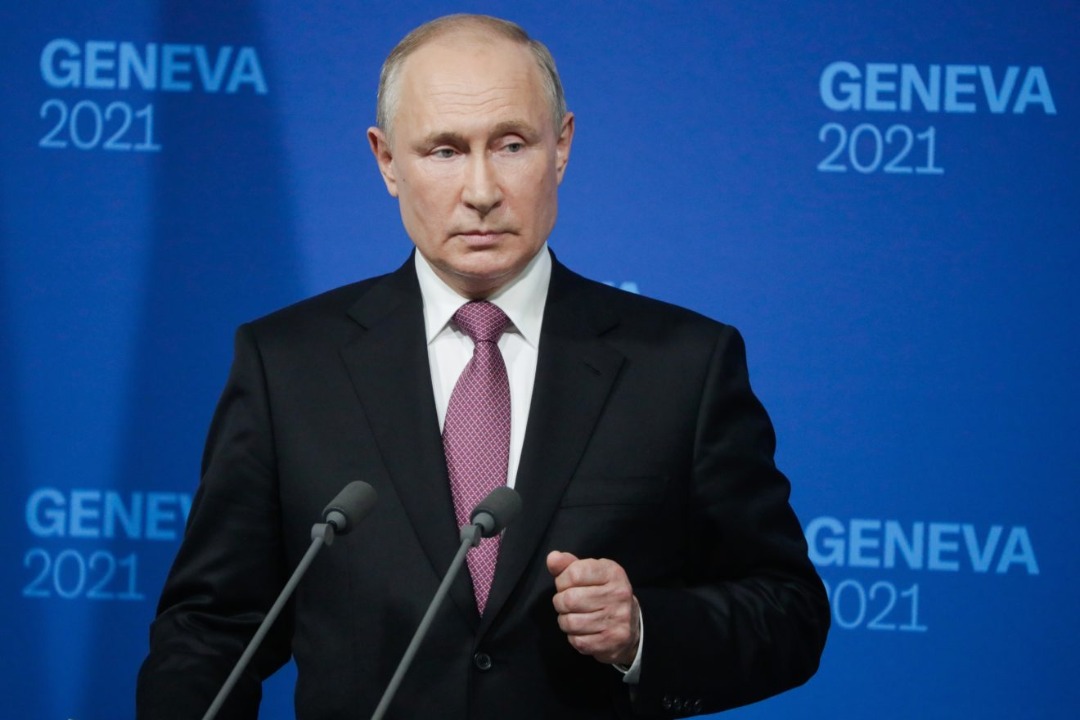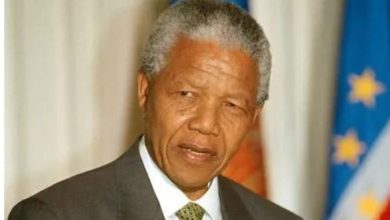After Biden-Putin, will Russian spies retreat to shadows?
High-profile cases on EU soil have posed big problems for governments

After Biden-Putin, will Russian spies retreat to shadows?
EU leaders weren’t present when Joe Biden met Vladimir Putin in Geneva but their territory will be a testing ground for whether Moscow has decided to change its ways.
Aggressive Russian espionage inside the EU has become increasingly public in recent years, with European governments openly accusing Russian agents of carrying out assassination attempts, sabotaging arms depots and hacking into political institutions with impunity.
Some European intelligence officials say Russian spies have become more brazen, caring much less about whether their work is exposed. Others say Russian agents have always been highly active on their patch; they’re just more visible now, thanks in part to the digital trails they leave behind.
“The masks have fallen,” said Arnold Sinisalu, head of the Internal Security Service of Estonia, whose proximity to Russia has made it keenly aware of Moscow’s clandestine behavior. “Russian intelligence services have neglected pretending to respect the international law, ethics or even human life in their actions in Europe.”
Intelligence officials say Europe faces a constant struggle to get to grips with these operations, which can be deadly, destructive and sow disinformation.
“Russian intelligence is a persistent threat to European countries,” said Antti Pelttari, director of the Finnish Security and Intelligence Service, Supo. “Its activity is on a high level practically all the time.”
The most sensational case to come to light in recent months emerged in April, when the Czech Republic said it had evidence Russian agents were responsible for explosions in 2014 at ammunition warehouses, which killed two people.
The allegations triggered a political storm between Prague and Moscow; the Czech Republic expelled dozens of Russian diplomats and embassy staff over the affair. Russia officially classed the Czech Republic as an “unfriendly state,” along with the United States.
Soon afterward, Bulgaria — which has already charged Russian citizens with poisoning an arms dealer — said it now also suspects Moscow’s hand in a series of blasts at arms warehouses between 2011 and 2020. Prosecutors say they suspect the attempted murder and explosions are connected to the Czech case.
One hypothesis — suggested by reporting from Bellingcat and other outlets — is that the blasts in the Czech Republic and Bulgaria, as well as the poisoning of the arms dealer, were intended to disrupt possible weapons and munitions exports to Ukraine.
Russia has dismissed those allegations, and others leveled against its spies in the EU, which it has suggested are part of effort to besmirch the country’s reputation.
“At least we have not been accused of assassinating Archduke Franz Ferdinand of Austria, not yet. It may come to that, by the sound of things,” Foreign Minister Sergey Lavrov said in April, deploying dry humor in response to the Bulgarian case.
Those denials don’t cut any ice with Western officials. But the cases have raised uncomfortable questions, particularly for EU capitals that have long played host to significant numbers of Russian intelligence operatives: Can the EU do anything to curb Russian operations on its soil? Or does it just have to hope Putin will change tack?
Cold War comeback?
The Russian operatives’ approach has echoes of the Cold War, when Putin served as a KGB agent in Dresden, then part of communist East Germany. In the Soviet era, Moscow was known for using “active measures” abroad — ranging from spreading disinformation and forgeries to sabotage and assassinations.
Putin’s political rise helped bring spies back into the heart of power after Russia’s intelligence services had been weakened during the turbulent 1990s.
Pelttari, the Finnish intelligence chief, said his agency sees Russia’s modern spies as having two main tasks — to gather classified information and to secretly influence foreign nations.
“Both of them are equally important tasks for Russian intelligence today,” he said in an email.
Moscow’s spies have long felt at home in European capitals, often working in oversized embassies where experts estimate up to a third of staff are spies. There are currently at least three Russian agencies operating abroad: the Federal Security Service (FSB) — the primary successor to the KGB — the Foreign Intelligence Service (SVR) and military intelligence service GRU.
Before the Czech revelations were made public, Prague was known as a city with a heavy Russian intelligence presence — a reputation Vienna and Budapest share.
But Russian agents are active across the continent, from Ireland to the Baltics — and they are increasingly making the front pages.
From February to May of this year alone, at least four EU countries— Bulgaria, Germany, Italy and Poland — accused people of trying to pass clandestine information to Russia.
Thomas Haldenwang, head of Germany’s main domestic intelligence agency, the Federal Office for the Protection of the Constitution, told the Welt am Sonntag newspaper this month that Russian intelligence activity in Germany has reached Cold War-era levels.
Russia has “a whole number of agents” trying to make contact with decision-makers, he warned.
The Baltic states have been particularly vocal about their concerns regarding Moscow’s intelligence operations.
Darius Jauniškis, director of Lithuania‘s State Security Department, said Russia’s intelligence agents have always worked against EU and NATO targets.
“In the past few years, however, we follow a disturbing trend when intelligence collection becomes almost a secondary task of Russian intelligence services,” he told POLITICO in a statement.
Now, Jauniškis said, the focus is more about measures such as swaying public opinion, polarizing European society and carrying out assassinations.
“We are strongly concerned about this shift,” he said.
Shifting spy landscape
Several factors help explain how Russia’s operations have become more visible over the past years: Moscow’s priorities are changing; the power dynamics within Russia’s intelligence community are shifting; and the West is simply getting better at spotting them.
“The Kremlin decided, essentially, that it was a political war with the West — and therefore, in some ways, it would operate more by what we could think of as wartime rules,” said Mark Galeotti, an expert on Russian intelligence services and senior associate fellow at the Royal United Services Institute, a U.K.-based think tank.
In this mindset, “you worry much less about the potential fallout, and you’re concerned much more with not missing on potential opportunities,” Galeotti said.
Meanwhile, Putin has started relying more on muscular operators from the GRU.
The Russian leader has become “disillusioned with the FSB” over the past years and “more attentive to what the military is giving him,” said Andrei Soldatov, a Russian investigative journalist who has co-written several books on Russia’s security services.
The GRU partly recruits from special forces, which “don’t see a difference between wartime and peacetime,” Soldatov said. They’re “much more brutal,” he added, and “more willing to take risks.”
Western governments have accused the GRU of carrying out a 2015 cyberattack against the Bundestag — where email accounts of multiple politicians, including Chancellor Angela Merkel, were affected. The U.S. accused GRU officers of carrying out spearphishing campaigns and hack-and-leak efforts ahead of the 2017 French elections, targeting President Emmanuel Macron’s party and other politicians.
The GRU was also accused of attempting to hack into the wifi network of the Hague-based Organisation for the Prohibition of Chemical Weapons (OPCW) in 2018, but the Netherlands Defence Intelligence and Security Service said it thwarted the attempted cyberattack.
GRU officers Anatoly Chepiga and Alexander Mishkin have been accused of conducting a poisoning using a Novichok nerve agent in Salisbury in 2018, targeting Russian defector Sergei Skripal. Czech authorities have also suggested the two men are connected to the 2014 blasts in the country.
Germany accused Russian government agencies of orchestrating the 2019 assassination of a former Chechen rebel commander, who was shot in broad daylight in a Berlin park.
In the age of social media, surveillance cameras and mobile phones, it’s become much harder for agents to cover their tracks. Moreover, some governments have become more amenable to alerting the public when they detect Moscow’s secret hand.
What’s changed over the past years has been “Western services’ and investigative journalists’ abilities to detect Kremlin malign activities, so they can attribute those actions to Russian special services and hold them accountable,” said Sinisalu, the Estonian intelligence chief.
“The Kremlin’s elite is not succeeding to conceal anymore that they use criminal methods and tactics to achieve their political ambitions, whether against other countries or their own people,” he added.
EU differences
While there is broad agreement among Western governments and intelligence agencies that Russia’s aggressive tactics represent a problem, that does not mean they’re united on how to respond.
Some countries — such as the Netherlands — have been vocal when uncovering Russian activity. Others choose to address issues quietly, or not at all.
Hungary’s government, for example, maintains friendly ties with the Kremlin — and has been criticized for turning a blind eye to some Russian intelligence activities inside its borders.
When the Czech Republic went public with its allegations on the munitions depot blasts, Europe-wide reaction was largely rhetorical. Slovakia, Romania and the Baltic states expelled diplomats in solidarity — and Bulgaria sent home a diplomat over its own suspicious blasts — but many other countries stuck to tweets and press releases.
Some question whether even actions that look tough, such as the mass expulsion of diplomats suspected of spying, have much impact.
Asking diplomats to go home is “a 20th century way of sending a message, but it’s not as effective because we’re not living in those days,” said Alina Polyakova, president of the Center for European Policy Analysis.
Expulsions are “meant to undermine Russia’s ability to spy and gather information,” she added, but in the digital age, having people on the ground is “less of a concern.”
Others say that in some cases it is worth letting operatives stay in the EU — and keeping a watchful eye.
“If you have resources you can afford to play games, letting spies go on with their operations, influencing what they can find, thereby deceiving them and/or collecting info about their operational interests,” a former intelligence official from the Central and Eastern Europe region said.
“Sometimes, however, you just cannot afford to have dozens of people working on a single case. So case-by-case you need to decide whether it is a better option to let them know that they are a subject of investigation, making their work impossible.”
Intelligence officials say information-sharing and coordination among European services has increased in recent years and that’s helped them keep tabs on Russian operatives.
Jauniškis, the Lithuanian security head, called EU and NATO members “increasingly conscious” of Russian threats.
The EU has imposed sanctions on numerous members of GRU, as a response to the Bundestag hacking, the Skripal poisoning case in the United Kingdom and the attempted OPCW cyberattack in The Hague.
But the European Union as a whole has yet to formulate a clear joint response that would worry Russia.
A new blueprint for relations with Russia presented this week by EU foreign policy chief Josep Borrell got a cool reception from EU diplomats in Brussels, who said it was too soft and lacked operational plans.
……… By Lili Bayer and republished by help Set them free International





